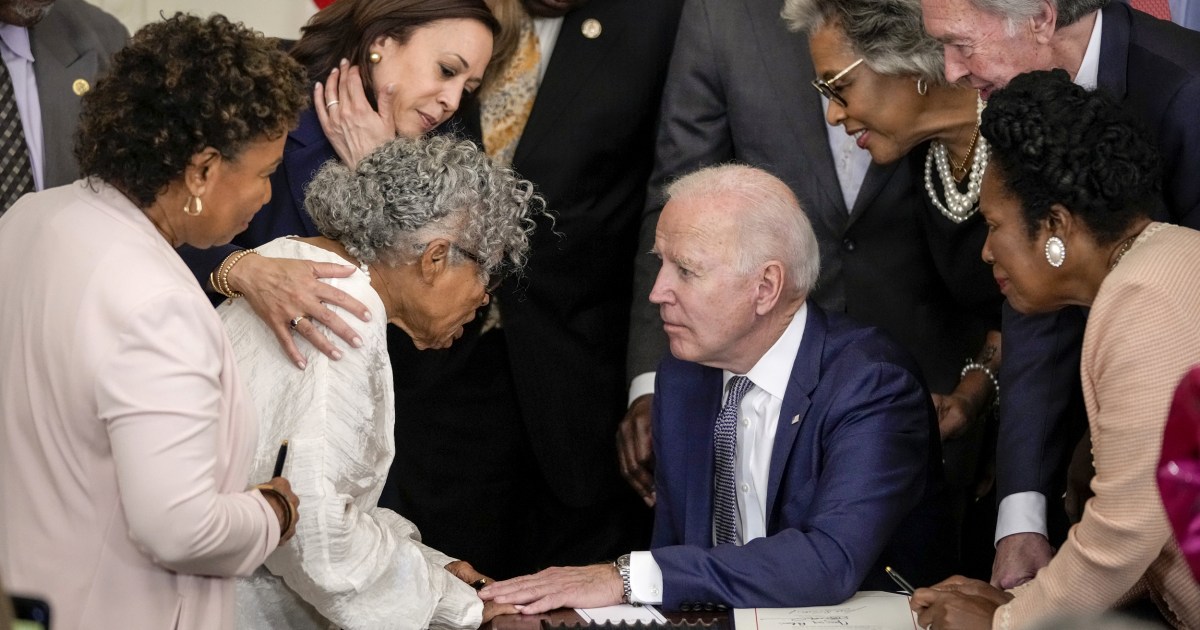
Even well into her 90s, Opal Lee was sure she'd live to see the day Juneteenth became a national holiday. "Indeed! I plan to be here. If the good Lord's willing and the creek don't rise!" Lee, 94, an activist in Fort Worth, Texas, told NBC News earlier this week.
And she was right. On Wednesday, Congress overwhelmingly voted to establish Juneteenth National Independence Day as a legal public holiday. The bill encourages the public to celebrate the holiday with "appropriate ceremonies, activities, and programs." The news came quickly to activists and organizers like Lee who have been advocating for decades to gain national recognition for Juneteenth.
Although support for the bill was overwhelming, 14 Republicans voted against it, including Rep. Matt Rosendale of Montana, who called the law an effort to "celebrate identity politics" and "make critical race theory the reigning ideology of our country." President Joe Biden signed the bill into law Thursday at a ceremony attended by advocates like Lee.
"I see this as a bridge, a bridge for unity and freedom," Lee said in the previous interview. "Juneteenth isn't just a festival — although a festival it is, and I love it! — it's so much more than that. I want us to celebrate from the 19th of June to the Fourth of July."
In 1994, leaders from across the country took part in a historic gathering at Christian Unity Baptist Church in New Orleans to advocate for the cause, according to the National Juneteenth Observance Foundation. Out of the gathering sprouted several groups dedicated to celebrating Juneteenth, including the National Juneteenth Observance Foundation. In 2000, the Rev. Ronald Myers, of the National Association of Juneteenth Lineage, began a campaign to have Juneteenth recognized as a holiday in all U.S. states and territories.
Lee dedicated her life to teaching and activism after a mob of 500 white supremacists burned down her family's Fort Worth home when she was just 12 years old. In 2016, at 89, she set out on a journey from Fort Worth to Washington, D.C., walking 2½ miles a day to raise awareness and campaign for making Juneteenth a national holiday. While she did not complete the trip, she said she logged hundreds of miles.
Troy E. Page Sr., who will be 83 on Juneteenth, has been fighting for the recognition for the last 15 years with the Ohio chapter of the National Juneteenth Observance Foundation. He was appointed director of the chapter by Myers, who died in 2018.
"It's an important victory for the individuals who have sought this for 20 years or so, Dr. Myers, and others who have worked tirelessly," Page said. "The slaves who were held in bondage two years longer, and their descendants, are really what this is about. We're recognizing those individuals who paid a tremendous price beyond when they should have been freed."
On June 19, 1865, Black Texans in Galveston, still living in slave conditions, finally learned that Abraham Lincoln had abolished slavery two years previously. Rep. Sheila Jackson Lee, D-Texas, who sponsored the House bill, said Wednesday that it's "been a long journey," but "we're here."
But lawmakers and organizers have made it clear that the holiday shouldn't be a substitute for adequately addressing systemic racism in the U.S. Sen. Raphael Warnock, D-Ga., said the commemoration should drive change, not stall it. Amara Enyia, policy and research coordinator for the Movement for Black Lives, shared similar sentiments.
"There are groups that have been working to push Juneteenth as a federal holiday for a number of years, and that work should not be dismissed," Enyia said. "However, when it comes to policies that will have a material impact on the conditions of Black people in this country, we cannot lose sight of that. People are looking for economic relief, student loan debt to be canceled, looking for housing, they want access to health care. … We don't get to put those things on the back burner in order to celebrate Juneteenth as a federal holiday. We push for substance, not symbolism."
Many states are embroiled in fights over whether to teach the nation's history of racism in schools. Meanwhile, a number of voter suppression laws aim to make it difficult for Black people to vote. And many Black communities could be targeted for racial gerrymandering in this decade's redistricting cycle. Black organizers are also fighting a slew of anti-protest bills, a backlash from last year's racial reckoning.
"There is a debt owed to Black people that hasn't been paid," said Rich Wallace, founder of Equity and Transformation, a Chicago social justice organization. "I'm excited about the recognition, but I'll be impressed when we live up to the meaning of what is recognized by Juneteenth."
Follow NBCBLK on Facebook, Twitter and Instagram.
The Link LonkJune 18, 2021 at 05:00PM
https://ift.tt/3gGIn5B
Juneteenth Day is a victory, but there's still work to be done - NBC News
https://ift.tt/2VuKK1x
Work

No comments:
Post a Comment